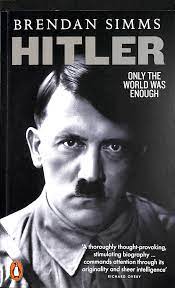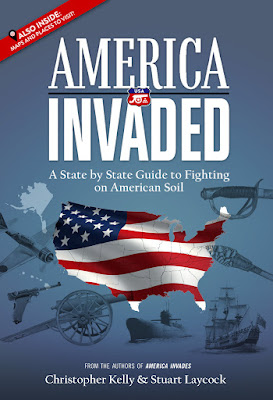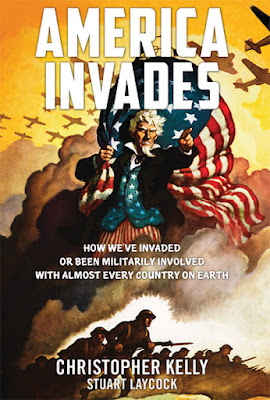 |
| Only the World was Enough |
The old rule of debating holds that the first side to use the word "Hitler" automatically loses!
Putin's invasion of Ukraine, however, makes it more important than ever for us to gain a better understanding of Hitler, dictators and the use of propaganda in human conflict.
Brendan Simms' Hitler (published in 2019) is a fascinating reexamination of the life of history's greatest villain (https://www.amazon.com/Hitler-Only-World-Was-Enough-ebook/dp/B07N13J5RL/ref=sr_1_3?crid=1MMT1DA179MTM&keywords=hitler+simms&qid=1647375789&s=books&sprefix=hitler+Simms%2Cstripbooks%2C88&sr=1-3). Simms is a Cambridge history professor who has tapped a huge mine of new research to develop a new take on the Fuhrer -- the man who, more than any other, propelled the world into the bloodiest war in human history..
Simms' central thesis is that Hitler was obsessed with America and the British Empire from his experiences as a soldier in the trenches in World War I. This obsession with and opposition to the Anglosphere was the driving force behind so many of his later actions. As a private in the 12th Royal Bavarian Infantry brigade, Hitler came into contact with two American prisoners in July 1918. Simms writes, "Hitler was convinced that these 'doughboys' were the descendants of German emigrants, lost to the Fatherland for lack of 'living space' to feed them, who had returned as avengers in the ranks of an unstoppable enemy army." Hitler's mission would be to reforge Germany in order to take on the Anglo-American world order -- a capitalist system that he both envied and detested. His virulent anti-semitism was a product of his disdain for the Anglo-American system as he believed that Jews ran the economies of all western allied nations.
There is no evidence that Adolph Hitler, born in Austria on April 10, 1889, was abused as a child, nor was he the product of a 'broken' home. His father Alois, Roman Catholic and not anti-semitic, died in 1903. Hitler expressed gratitude to Eduard Bloch, the Jewish doctor who unsuccessfully cared for his cancer-stricken mother who died in 1907. The start of World War I in 1914 saw him join the Bavarian army with some enthusiasm. His experiences in the trenches on the western front were formative in shaping his outlook for the rest of his life. He served for four years in the war as a regimental dispatch runner, where he was wounded, gassed and decorated. But he showed almost no early signs of leadership ability during the four years of the Great war.
The "humiliation" and occupation of Germany which followed the Treaty of Versailles would provide grist for Hitler's political career in the 1920s and beyond. He famously launched a beer hall putsch in Munich in the fall of 1923. Imprisoned at Landesberg, he wrote the first volume of his famous tortured work Mein Kampf. Early readers could already discern his desire to get rid of "international Jewry" and his faith in the need for Lebensraum for the resettlement of the German people. The rise of Mussolini it Italy with the 1922 March on Rome provided inspiration for those with fascist sympathies though little tangible assistance for his Nazi party.
Hitler would likely have remained a minor footnote in Weimar political history had it not been for the onset of the Great Depression which was kicked off with the Wall Street crash of October 1929. High unemployment swelled the ranks of the Nazi party bringing them to power in 1933.
Simms argues, convincingly, that Hitler was obsessed throughout his adult life by the economic and military power of the British Empire and the United States of America. He admired their control of vast amounts of land and their 'Anglo-Saxon' work ethic. He deplored the migration of Germans to lands under their control. He saw America's Great Plains as a perfect answer to the challenge of Lebensraum. During WW2, he directed German industry to construct Amerika jet bombers for the Luftwaffe despite the fact that jet fighters / interceptors would have been much better for the war effort. Yet, almost inexplicably, Hitler never bothered to actually visit Britain, the USA or any English speaking country during his lifetime. How would history and our world have been different had he done so?
 |
| Dwight Eisenhower 1890 - 1969 Grosvenor Square, London |
Simms' work becomes particularly intriguing when it focuses on the many Americans of German descent who helped enormously to defat the Nazis. Dwight Eisenhower, architect of the D-day landings, was the descendant of "pacifist Menonites who left the Saarland for Pennsylvania in the 18th century". General Clarence Hubner (commander of US V Corps) has a grandfather from Stuttgart. Carl Spatz (later 'Spaatz') , commander of the US Strategic Air Forces in Europe that pounded German cities into dust, was of German ancestry. Bertram Hoffmeister (Canadian 5th Armored Division) had a grandfather from Hamburg. Simms neglects to mention Admiral Chester Nimitz of the US navy who commanded American forces at the decisive battle of Midway; Nimitz was from the German community in Fredericksburg, Texas.
 |
| John Basilone Italian-American Medal of Honor winner |
Understandably in a Hitler biography, Simms does not elaborate on the contributions to the Allied war effort made by other "Axis-Americans". Around one out of twelve American servicemen in the war were of Italian-America descent (see Italy Invades: How Italians Conquered the World for much more...www.italyinvades.com). Enrico Fermi was an Italian physicist who helped make the American atomic bomb. Japanese-Americans serving in the 442nd regimental combat team ("Go For Broke") won an extraordinary number of medals. And so on...
 |
| 442nd Medal "Go For Broke" |
Simms emphasizes Hitler's prioritization of politics over economics. Hitler explains, "The economy is only of secondary importance. The main thing is national pride, love of country." Hitler consistently opposed free trade and capitalism. He wanted to exert national control over the levers of international financial manipulation to supplant what he perceived, or really misperceived, to be a lurking Jewish cabal.
Hitler held deeply ambivalent views about the German Volk or people. He fretted over the racial coherence of the Fatherland. He worried that that the best elements of the Reich had emigrated weakening the Volk. He was more than willing to destroy those of his confederates who were most loyal to him -- in June of 1934 he personally arrested at gunpoint Ernst Rohm of the SA who was murdered in custody soon after. He later forced Rommel to commit suicide. He was always willing to ruthlessly crush anyone who opposed him, regardless of ideology or nationality.
As a strategist in World War II, Hitler displayed, to put the matter in chess terms, a strong opening game, a flawed middle game and a catastrophic end game. (It seems that Putin, by contrast, cannot even manage a strong open with his invasion of Ukraine.). Hitler essentially used the German Volk as his pawns in the world war. See also...https://www.blogger.com/blog/post/edit/4122629330054677829/7925457983853508406)
Simms concludes that "If Hitler's relationship with the British Empire and the United States was ultimately antagonistic, it was also admiring and entangled, He long hoped for a British alliance and he never ceased to exalt the supposed racial qualities of the 'Anglo-Saxons' on both sides fo the Atlantic, and to believe that they represented Germany's 'better' racial half. Anglo-America was Hitler's model, much more so than Stalin's Russia or even Mussolini's Italy. The original for the Lebensraum project was the British Empire, and especially the American colonization of the west. Hitler and the Third Reich were thus a reaction not to the Russian Revolution but to the dominance of Anglo-America and global capitalism. The Holocaust was not a distorted copy of Stalin's Great Terror. but a pre-emptive strike against Roosevelt's America."
Ironically, Hitler's Reich would be pulverized by the industrial capacity and aerial might of 'Anglo-Saxon' nations that were his model (See Mission: Jimmy Stewart and the Fight for Europe...https://www.blogger.com/blog/post/edit/4122629330054677829/752507954240654469). Hitler, in conversations with Albert Speer, shared his fevered dreams about a New York in flames. Instead of putting a torch to Manhattan with his new super jets, the Fuhrer managed 1) to nearly annihilate the German people, 2) to welcome Stalin into Eastern Europe and 3) to set America on a path to becoming a superpower.


No comments:
Post a Comment